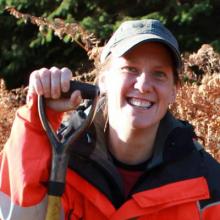Ella Furness
What are your main responsibilities or activities in your current position?
At Cardiff University I am funded by the UK's Economic and Social Research Council 1+3 scheme and the Scottish Forestry Trust. This has enabled me to do an MSc in Social Science Research Methods at Cardiff University as a foundation for my PhD, and I am now working on my doctorate.
How does your current work relate to your graduate degree?
At UBC my research was about community responses to climate change, particularly in response to the impacts of climate change on forests. Now, building on the work I did in Canada, my UK based research is about community participation in ecological restoration. We have seen that restoration is more successful if it engages local people and is embedded in local history, society, and culture, and there is substantial evidence that participation in activities like restoration can improve human wellbeing. However, in addition to these well supported areas of knowledge, there is a premise that participation in ecological restoration can create long term, durable relationships between people and ecosystems, which, once established, can provide an underpinning to a change in the way humans relate to nature – from a way based on the consumption of nature to one based on reciprocity. Thus, restoration is thought to have the potential to contribute towards sustainability. Within the literature these ideas are influential, but evidence to suggest that those engaged in restoration have a different relationship with nature or ‘the land,’ or that communities involved in or hosting restoration are more sustainable is sparse. My research aims to look at the impacts of participation in restoration to see what role, if any, it could play in building sustainable communities.
What do you like and what do you find challenging about your current position?
I love the chance to think and explore with research.
Is your current career path as you originally intended?
Absolutely not. I originally completed a degree in Geography and Environmental Studies at Sussex University (1998), then trained and worked as a community worker and managed a wood workshop at a social enterprise (community wood recycling) project in Bristol (2000-2010). I went back to school at UBC (when I was 35) because I wanted the chance to think more deeply about the work I was doing and the links between communities and social and environmental change. Although I loved everything about studying forestry at UBC, I thought I would go back to my old area – making things out of wood, hopefully in a community setting. But I found myself collaborating with my old supervisor and other researchers on articles after I moved back to the UK, and I found I loved the process of writing and constantly learning. Thus: the PhD.
What motivated you to pursue graduate work at UBC?
I wanted to learn about forestry, and it seemed to me like UBC was the best place in the world to do that. The truth is I googled "forestry degrees," and UBC looked great.
What key things did you do, or what attitudes or approaches did you have, that contributed to your success?
I think putting the effort in, even when I don't know what the outcome would be, has helped me. You have to work hard to write a good article or funding application, but even if you think it's great, or you've done your absolute best, you don't know that other people will think it's worth anything. You have to have faith, or take that leap of optimism to make things happen. I also think having an open heart helps. Academia relies on goodwill and kindness in a way to enable people to improve and move forward. I found that people take the time to write references for you, or chat to you about your options. I think paying it forward allows me to feel like I'm part of something bigger and helps me feel happy, so I like to volunteer for a few key things and get involved when I'm asked.
What is your best piece of advice for current graduate students preparing for their future careers?
For me the best advice that I had is "If you don't apply you can't win." My supervisor Harry really encouraged me to try to be confident and apply for grants, submit articles to journals, and reach out to people working in the same area. I had no idea that people would actually fund me and publish my work, but, so far, they do.
How did you find out about/obtain your current position?
I applied for my PhD after I saw it advertised on a website for academic positions: www.jobs.ac.uk
How are jobs normally posted and filled in your organization or industry?
To do a PhD you need to either apply for a position that is funded already (usually directly to the host university) or devise a research topic and approach professors or researchers you would like to do the work with and people and institutions you think might fund the work.

